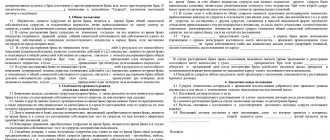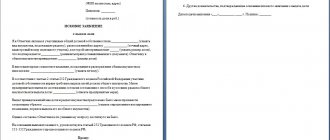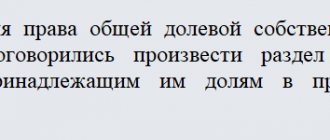Property that is in shared ownership can be divided by agreement between all owners, and if no agreement is reached on the method and conditions of division, through the court.
Property not subject to division Certain types of property determined by law are not subject to division. In particular, such property includes: 1) indivisible things, that is, things the division of which in kind is impossible without destruction, damage or changing the purpose of the thing (for example, a car); 2) common property of the owners of premises in an apartment building; 3) property constituting a mutual investment fund; 4) property constituting the mortgage coverage; 5) monuments and ensembles, including those related to the housing stock, as well as land plots located within the boundaries of their territories. In addition, division of property in shared ownership is not allowed if it is impossible without disproportionate damage to such property. Disproportionate damage should be understood as the impossibility of using property for its intended purpose, a significant deterioration in its technical condition or a decrease in material or artistic value (for example, a collection of paintings, coins, libraries), inconvenience in use, etc. Let's consider the algorithm for dividing property located in shared ownership, using the example of real estate. An extrajudicial procedure for the division of property An extrajudicial procedure for the division of property is possible only if the remaining owners are ready to discuss the conditions of such a division and it is possible to reach agreements on the allocation of specific parts of the property to account for the shares of each of the participants. To divide property that is in shared ownership, by agreement of the parties, we recommend following the following algorithm. 1. Determine the parts of real estate for division When dividing real estate in kind, you should take into account the requirements that the real estate resulting from the division must meet. Thus, land plots formed as a result of division must comply with the requirements of the law, in particular, on the maximum minimum sizes and location of boundaries. If we are talking about a residential building or apartment, then the real estate objects formed as a result of the division must be isolated, suitable for living, have a separate entrance and independent communications. Thus, before division it may be necessary to carry out reconstruction and (or) redevelopment work. After the real estate objects resulting from the division have been formed, you should contact a cadastral engineer to carry out cadastral work, as a result of which technical and (or) boundary plans will be prepared showing the characteristics of the objects being formed. The contract may provide for the obligation of the cadastral engineer to place the technical and (or) boundary plans prepared by him for temporary storage in an electronic storage facility maintained by the rights registration authority. If provided for in the contract, the plans can also be drawn up in the form of paper documents and issued to you. 2. Conclude an agreement on the division of real estate with all owners. The agreement specifies the address, cadastral number and other characteristics of the property, information about the owners, as well as the division procedure. As a general rule, the value of the property allocated to each of the co-owners should be proportional to his share. If the value of the allocated property is disproportionate to the share, the difference may be compensated by an appropriate monetary payment or other compensation. The provision for compensation must be reflected in the agreement. The agreement is drawn up in writing according to the number of property owners and must be signed by each of them. Such an agreement does not require mandatory notarization, unless you submit documents to Rosreestr by mail. 3. Contact Rosreestr For state cadastral registration and registration of ownership rights to real estate formed as a result of the division, as well as termination of the right of common shared ownership and deregistration of the original property, the following documents must be submitted to Rosreestr: 1) identification documents of the applicants ; 2) statements from each of the co-owners; 3) agreement on the division of real estate; 4) title documents for the original property; 5) a notarized power of attorney for the representative (if the documents are submitted by the representative). If a technical or boundary plan is placed in electronic storage, the identifying number of the plan can be indicated in the application. In this case, submission of the plan itself will not be required. Documents can be submitted to Rosreestr in one of the following ways: - directly through “My Documents” (MFC) (regardless of the location of the property according to the list of departments that accept on an extraterritorial basis posted on the Rosreestr website). In the city of Goryachy Klyuch, documents for state registration are accepted only through “My Documents” (MFC), except for acceptance on an extraterritorial basis; - by postal item with a declared value when forwarding it, a description of the contents and a notification of delivery (in this case, the authenticity of the applicant’s signature on the application must be notarized, the agreement and power of attorney of the representative must be notarized, and copies of identification documents must be attached); - in the form of electronic documents via the Internet, for example through the official website of Rosreestr. To register property rights, you must pay a state fee. It is not necessary to submit a document confirming payment of the state fee along with the application. The applicant has the right to do this on his own initiative. However, if there is no information about the payment of the state duty in the State Information System on state and municipal payments, after five days from the date of filing the application, Rosreestr will return the application and the documents attached to it without consideration. Amount of state duty The amount of state duty for registering ownership of newly formed real estate is: - 350 rubles. - in relation to a land plot intended for personal subsidiary farming, dacha farming, vegetable gardening, horticulture, individual garage or housing construction; — 2,000 rub. - in relation to other real estate objects. If it is possible to submit an application and pay the state fee through government services portals and other portals integrated with the Unified Automated Identification of Information and Logistics, the state fee is calculated taking into account a coefficient of 0.7. If at the time of submitting the application the state duty has not been paid, the applicant is issued or sent information containing a unique payment identifier (unique accrual identifier) necessary to confirm the fact of payment for a specific service, indicating the date by which it must be paid. 4. Receive documents after cadastral registration and state registration Cadastral registration and state registration are carried out within 10 working days from the date Rosreestr receives the application and documents. If the application was submitted through “My Documents” (MFC), then the period for consideration of the application will be 12 working days. This period begins on the next working day after the date of receipt of documents. State registration and cadastral registration are certified by an extract from the Unified State Register of Real Estate, which can be sent to you electronically. Judicial procedure for the division of property If an agreement on the method and conditions for the division of property in shared ownership could not be reached, the interested owner has the right to demand the allocation in kind of his share from the common property in court. Other owners also have the right to file counterclaims for the allocation of their shares in kind with the termination of the right of shared ownership of the property. To divide property in shared ownership in court, we recommend adhering to the following algorithm. 1. Prepare a statement of claim and the necessary documents. In the statement of claim, you should identify the real estate property (indicate the cadastral number, address, area, other characteristics), describe the nature of use of the property that has developed between the owners, indicate which part of the property should be allocated to the plaintiff and which to the defendant, as well as the amount and calculation of compensation (in case of disproportionate share). The following documents should be attached to the statement of claim: 1) documents confirming the possibility of division (allocation) of real estate, for example, a conclusion from a construction and technical organization on the possibility of the proposed division (allocation); 2) legal documents for real estate; 3) a receipt for payment of the state fee for consideration of the case in court, the amount of which, as a rule, is calculated based on the price of the claim; 4) copies of the statement of claim according to the number of defendants and third parties. Depending on the circumstances of the case, other documents may also be required. 2. File a statement of claim with the court and take part in the court hearing. The statement of claim is submitted to the court of general jurisdiction at the location of the property. During the trial, to resolve the issue of the possibility of the proposed allocation and the proportionality of the allocated part to the owner’s share, the court may order a judicial construction, technical, land management and assessment examination in the case. To resolve a legal dispute, you may need qualified legal assistance. If a corresponding written petition is filed, the court may recover the costs of paying for the services of a representative in full or in part from the defendant. 3. Contact Rosreestr By analogy with an out-of-court settlement of the issue, in the event of a positive court decision on the division of property or the allocation in kind of a share in real estate, it is necessary to carry out cadastral registration and register ownership of the property. To do this, the following documents must be submitted to Rosreestr: 1) an identification document of the applicant; 2) application for state cadastral registration and state registration; 3) a court decision that has entered into legal force in two copies; 4) a notarized power of attorney (if the documents are submitted by a representative). The procedure for submitting documents, as well as paying state fees, is similar to that described in step 3 of the out-of-court section.
How is the deceased’s share in a privatized apartment inherited?
The privatization of housing in Russia began back in 1991 and continues to this day. Many people became the owners of a separate living space.
Often, apartments became the property of citizens on the right of common ownership - when housing was registered as joint or shared ownership (Article 245 of the Civil Code of the Russian Federation).
Inheritance of individual shares does not differ from the usual inheritance procedure. The applicant must collect documents, contact a notary, evaluate the property, pay the state fee and obtain a certificate of inheritance. Next, the received share is registered.
Who will get the share of the deceased person?
| No. | Who will receive the inheritance |
| 1 | If the property was privatized during the marriage, then the share of the deceased spouse is inherited in equal parts by the first-priority heirs (for example, if there are three heirs, each of them will receive 1/3 of the deceased’s share). |
| 2 | The owner of a part of the property can assign his share in the apartment to one or more persons, including those who are not relatives. |
| 3 | If the privatization of the apartment took place before the registration of the marriage relationship, such property is recognized as the property of one of the spouses. Consequently, it is subject to inheritance in the general order. |
Even if the property was accepted in fact (possession, use, management, payment of debts, protection), it will subsequently need to be re-registered. If the heir does not meet the 6-month deadline, he will have to collect additional evidence about the actual acceptance of the inheritance.
Their absence will lead to protracted legal proceedings. To learn how to defend your rights to an actual inheritance, read our article “Recognition of the fact of acceptance of an inheritance and recognition of property rights.”
Example:
The Frolov couple privatized a 2-room municipal apartment in Balashikha. The privatization agreement was signed by husband and wife. A year later they had a child, and three years later the head of the family crashed on a motorcycle. There is a need to divide the inheritance: according to the law, part of the husband’s apartment goes to his wife and daughter - heirs of the first line of kinship. Thus, in the total amount, the woman’s share will be ¾ - the remaining + the share of the deceased spouse. The child will receive ¼ of the housing.
If the apartment was privatized only for the husband, then when dividing the inheritance, each applicant would be entitled to ½ of the property.
Who is entitled to receive a share?
The Civil Code of the Russian Federation divides heirs into seven lines, which enter into inheritance in turn. However, the circle of applicants is not limited to this. Let's consider who can inherit a share in a privatized apartment.
Heirs by law
The standard order of inheritance of a share is from close relatives to distant ones . First, the spouse, children and parents of the deceased enter into rights - they are included in the group of priority candidates for property (clause 1 of Article 1142 of the Civil Code of the Russian Federation).
If there are no heirs of the first stage, they refused the inheritance or did not enter into the right within the period allotted by law, the right to the share passes to the second stage of kinship. Read about who is included in it and how they inherit in the article “Heirs of the second stage according to the law.”
Further, in the same way, other applicants will be able to enter into the inheritance - up to the 7th stage of kinship.
Please note that the share in a privatized apartment is divided only between heirs of the same line of kinship. If a spouse, children and parents enter into the inheritance, the share cannot be inherited by the brother or grandfather of the deceased - since they are classified in other queues.
Heirs by will
A will is a priority option for dividing the owner’s property. The administrative document actually changes the composition of the heirs and the size of their shares.
The owner of a privatized apartment or part of it independently decides to whom to transfer personal property (Clause 1 of Article 1119 of the Civil Code of the Russian Federation). Moreover, in his decision he is not related by family ties - a share in the apartment can go to a complete stranger (for example, a roommate or mistress).
Inheritance under a will is practically no different from the usual procedure. If the heir under the will does not claim rights within 6 months, he loses his advantage over other claimants to the assets.
Consequently, only other claimants under the will will inherit. And if they are not there or they write a waiver, the heirs at law are in accordance with the order of kinship.
Heirs by right of representation
The right of inheritance arises from the relatives of the heir if he dies before the testator. The division of its share is carried out in equal shares between the applicants.
For example, if an heir has a spouse and a child, each of them will receive ½ of the inheritance that was due to the deceased heir.
Dependents
There is another category of heirs who have benefits when inheriting. We are talking about disabled parents, spouse, children, as well as dependents of the testator. They are entitled to half of what they would have received if inherited by law (Clause 1 of Article 1149 of the Civil Code of the Russian Federation).
For example, if the testator disinherited his father, the heir will receive ½ of the share of the apartment. The remaining shares will be divided among other heirs of the first line of kinship.
How to split utility bills
After dividing the joint property, it becomes necessary to distribute payments for utilities.
Help: Division of a personal account is allowed only after registration of shared ownership rights in Rosreestr.
To open different personal accounts in the name of each owner, you must write an application to the management company, to which is attached:
- copies of passport;
- extract from the Unified State Register.
Utility payments are calculated in proportion to the size of each owner's share.
If the parties cannot independently agree on the division of utility bills, then they need to go to court. A statement of claim for the division of personal accounts can be filed simultaneously with a claim for the division of living space.
The claim is filed in the district court at the location of the property. When applying to a judicial authority, a state fee is paid, the amount of which is determined in accordance with Article 333.20 of the Tax Code of the Russian Federation.









